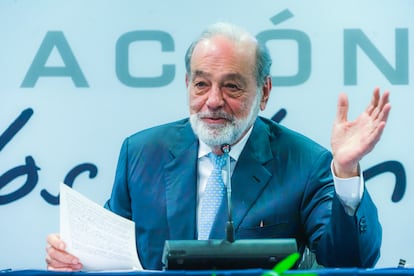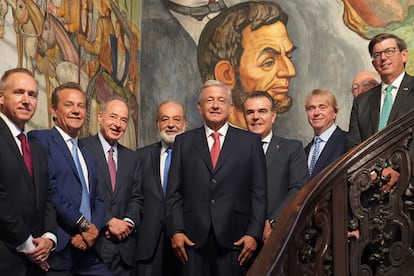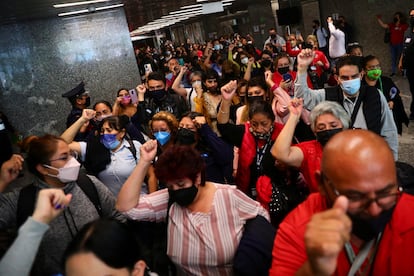Mexican tycoon Carlos Slim takes stock of the last six years in his home country: ‘Except for security, everything looks good and will continue to go well’
In a four-hour press conference, the richest man in Latin America discusses his business empire, the outgoing López Obrador administration and upcoming elections

Carlos Slim, the wealthiest man in Latin America and founder of Grupo Carso, recently expressed his view on Mexico’s outgoing López Obrador administration and shared his expectations for the next six-year presidential term. In four months, Mexico will elect a new president and Congress. “This administration was transitional. I hope the [next] one — whoever wins — will solidify the gains that have been made,” Slim said on February 12 during a nearly four-hour press conference in Mexico City. The 84-year-old engineer has a net worth of $100 billion and doesn’t usually hold press conferences. But when he does speak publicly, Slim doesn’t hesitate to openly expresses his positive and critical views on the issues facing Mexico. He spoke about the state of his business empire and discussed his agreements and differences with the López Obrador administration. Slim voiced his support for the separation of powers and the proposal to increase salaries for teachers and doctors. But he decried the country’s security situation and the privileges granted to state-owned enterprises.
Carlos Slim made headlines recently when López Obrador mentioned in one of his morning briefings that during the 2018 presidential election, a group of powerful individuals approached Slim and asked him to run as the candidate of a PRI-PAN political coalition. “There were some proposals that I’m not going to discuss,” Slim told his audience. “When he leaves office, I plan to talk to the president about a number of things.” Slim has developed a strong relationship with López Obrador. He serves on the president’s Business Advisory Council and frequently meets with him at the National Palace. Slim also accompanied the president on the new Maya Train, a project in which his companies are involved. “As he mentioned, we have several differences. We have things to talk about — once his term is over — beginning with our views on Porfirio Díaz.” The reference to the late 19th-century dictator, who was ousted after three decades in power at the onset of the Mexican Revolution, made reporters laugh. López Obrador is a fierce critic of Díaz, whom he sees as a betrayer of democracy, a representative of the elites, and a supporter of U.S. interventionism. “I think he was a great president,” Slim said. “He governed for 30 years — perhaps too long — but he modernized the country.”
On politics
Slim’s middle-of-the-road stance regarding López Obrador’s policies separates him from others in the private sector who openly oppose the president and Claudia Sheinbaum, the ruling party’s candidate for president. He pointed to the country’s violence and security problems as “lingering issues that we all want resolved.” Slim said that the security problem has not only harmed his companies, but also directly affects customers — especially telephone customers — due to rampant copper theft. On the other hand, he believes the country enjoys a “social peace — there is no direct conflict” among the people apart from normal political activism. “The only concern is about security. However, the overall attitude of the public remains positive, regardless of party affiliation or other disagreements. Except for security, everything looks good and will continue to go well.”
Slim firmly believes that the June 2 elections will be peaceful, with no post-election conflicts that could endanger the country’s democracy. “We’ve had 90 years of peaceful transitions of power. No matter who wins the upcoming elections, I don’t see any major confrontation happening like someone refusing to accept defeat. I’m not too worried about that.” Slim said he knows both Sheinbaum and opposition candidate Xóchitl Gálvez, and admitted to being “surprised that we will be led by a woman for the first time. Let’s hope she does well.” He has positive things to say about both candidates. “I think they are both highly committed and they are obviously passionate about becoming president. This type of commitment requires a great deal of courage and a genuine desire to do things right.”

Slim believes that the current president has respected private enterprise, even though he wants the government to have greater involvement in the aviation, telecommunications and banking sectors. “The important thing is that he has respected the private sector, which I believe is working well,” said Slim. He noted that early in his term, López Obrador addressed inflation, public finances and the government budget, and also increased revenue without new taxes. “I think everyone in the business world agrees that this needed to be done, and I believe it was generally very healthy.”
Slim agrees that the government should compete with the private sector “on a level playing field.” However, he believes that the private sector is more efficient since it has no political bias. It’s an interesting admission considering Slim realized windfall profits in the early 1990s when the Mexican government began privatizing its telecom industry. “I have a strong belief that contradicts the prevailing government narrative. In terms of expertise in managing human, financial and material resources, who do you think does it better: the businessperson or the politician?” Slim asked rhetorically. “I think the businessperson does... When people say that state-owned companies are very well run — they’re trash, man! Pemex’s top managers only last two years. In each of the last three presidential terms, [they lasted] two years. You can’t have a company that changes management every two years. That was Pemex under Fox, Calderón, and the last president [Peña].” Slim added that Peña handed López Obrador a state oil company with high debt and low production levels.
Slim has also criticized expanding the scope of the military, which is now involved in public works construction, and seaport and airport administration. “I think the Armed Forces are excellent, but I think it’s too much. For example, when they were tasked with construction projects, it was very good, because… we have some excellent military engineers. It’s better for soldiers to be working than doing nothing in the barracks.” While he praised the skill and speed of military engineers, Slim said, “It’s excessive for them to be involved in so many things.”

Regarding the package of 20 reforms President López Obrador sent to Congress last week — which includes changes to the Judiciary, the National Guard and the pension system — Slim said “some aspects are very good and others are just so-so.” He appreciates the current administration’s commitment to the separation of powers in government. Despite López Obrador’s conflicts with judges, the Supreme Court is an effective counterbalance, unlike in past administrations. “It’s wonderful that the three branches of government have differences. The Supreme Court disagreeing with the Executive Branch used to be rare. The Executive Branch had a great deal of influence over the Judiciary Branch. It seems extraordinary to me that the Judiciary now makes decisions that the Executive opposes.”
Slim highlighted other agreements and disagreements with López Obrador. He backed initiatives like the right to internet access, and more U.S. investment in Latin America and the Caribbean to address the root causes of migration. However, he opposes increasing worker pensions and a 40-hour work week.
From Telmex to the hunt for ‘black gold’
Now 84 years old, Slim has had a long business career. It began with the founding in 1965 of the Jarritos del Sur soft drink company and expanded exponentially with the América Móvil telecommunications empire. His business group includes huge investment (Grupo Financiero Inburs) and real estate (Inmobiliaria Carso) companies. In the 1980s, Slim made a series of strategic investments in financial and telecommunications assets: Cigatam, Sanborns, Minera Frisco and others.
Slim has made sustained investments in telecommunications since 1990, when he bought the newly privatized Teléfonos de México (Telmex) for $8.615 billion. Despite claims of favoritism gained from his close relationship with President López Obrador, Slim reveals that Telmex has operated at a loss for a decade without paying dividends due to competition barriers and labor liabilities. “We are the only [telecommunications] company in the world that does not have pay television service. Telmex is no longer a good business.”
Slim says he won’t sell Telmex as he’s committed to keeping it a Mexican company, and will continue investing in fiber optics to retain market share. “I’m not going to sell Telmex because it’s Mexican. Otherwise we would have already sold it. I agreed with my children that we weren’t going to sell it.”

The group aims to keep Telmex in its business portfolio, but faces the challenge of funding the company’s labor liabilities, valued at 270 billion pesos ($15.7 billion). Slim claims that the plan to exchange these liabilities for Telmex shares was hindered by the Mexican Treasury Department’s refusal to forgive taxes on these shares that workers would have to pay. Slim is still working on Telmex’s financial recovery, which is bolstered by its subsidiaries’ profits.
Regarding the government contracts his companies have won during the López Obrador administration, Slim said they have not been larger than in past administrations. He noted that the only contract they won under the current administration was 90% of Section 2 of the Maya Train. “I don’t see how this administration has benefited me,” he said.
From telecom towers to the ocean floor, Slim now seeks to boost his involvement in the petroleum sector. He holds a significant stake in the huge Zama offshore oil field, in partnership with Talos Energy. With over 50 years in the public eye, Carlos Slim has deftly navigated the ebbs and flows of changing governments in Mexico. He assiduously maintains a strategic distance that affords him influence in the National Palace while he continues to solidify his business empire.
Sign up for our weekly newsletter to get more English-language news coverage from EL PAÍS USA Edition
Tu suscripción se está usando en otro dispositivo
¿Quieres añadir otro usuario a tu suscripción?
Si continúas leyendo en este dispositivo, no se podrá leer en el otro.
FlechaTu suscripción se está usando en otro dispositivo y solo puedes acceder a EL PAÍS desde un dispositivo a la vez.
Si quieres compartir tu cuenta, cambia tu suscripción a la modalidad Premium, así podrás añadir otro usuario. Cada uno accederá con su propia cuenta de email, lo que os permitirá personalizar vuestra experiencia en EL PAÍS.
¿Tienes una suscripción de empresa? Accede aquí para contratar más cuentas.
En el caso de no saber quién está usando tu cuenta, te recomendamos cambiar tu contraseña aquí.
Si decides continuar compartiendo tu cuenta, este mensaje se mostrará en tu dispositivo y en el de la otra persona que está usando tu cuenta de forma indefinida, afectando a tu experiencia de lectura. Puedes consultar aquí los términos y condiciones de la suscripción digital.








































